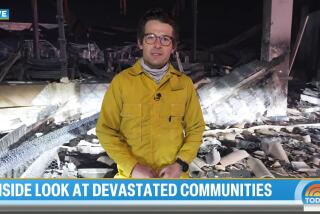New TV Riot Poll Sets Off Debate : Television: L.A. news directors disagree with those in national survey who believe coverage fanned riots elsewhere.
- Share via
Los Angeles TV news directors hold firm to their belief that television news coverage of the rioting here last month cannot be blamed for the behavior of looters and arsonists, even though a survey of their colleagues across the country found that a majority said that TV coverage did contribute to rioting in other cities.
Nearly 56% of the approximately 100 news directors, assignment editors and producers surveyed by Nielsen Media Research in late May said that pictures of the disturbances in Los Angeles helped spark rioting elsewhere. About 36% of the TV journalists from “scientifically chosen” large, medium and small markets disagreed, saying that TV coverage did not play a role in provoking additional violence. Just over 8% had no opinion or refused to answer.
The poll was designed simply to sample opinions of TV news decision-makers after many television critics and other observers had reproached television for fanning the flames of the unrest both here and elsewhere, said Al Gough, spokesman for the company that commissioned the poll, Medialink, a distributor of video news releases and other public relations material. The survey did not ask them if they regretted broadcasting pictures of the riots or if they found fault with the way most TV stations reported the news.
Nevertheless, two local news executives reacted strongly. Jeff Wald, news director at KCOP-TV Channel 13, called the notion that TV coverage of events in Los Angeles prompted rioting in other cities “ludicrous,” while Warren Cereghino, news director at KTLA-TV Channel 5, labeled it “a bunch of baloney.”
“TV did not cause people to go out and riot or loot or pillage or burn or stab or shoot,” Cereghino said. “People were going to do that no matter what once they heard about the verdict (in the Rodney G. King beating case). I reject categorically that television was responsible for that. Even if there had not been any television coverage, they were going to riot.”
“To intimate that maybe you shouldn’t show pictures of what is going on for any reason gets you into very gray area and then the information available to the public starts getting more and more filtered,” Wald said. “Today we’re all faced with the situation that by the time information gets to the media, quite often it is so watered down by public relations people or spin doctors hired by corporations or government agencies that the truth is getting harder and harder to find. Anything that would impede the search for the truth, any suggestion of censorship or thinking twice about showing pictures, that worries me more than anything else.”
John Lippman, news director at KCBS-TV Channel 2, noted that the question asked in the survey was whether the coverage contributed to rioting in other cities, not whether it caused such rioting outright. “They have to explain it somehow, and what they are saying is that the TV coverage is a factor--and it probably is, just like the free press is a factor in what goes on in a democratic society,” he said.
Lippman added that he wasn’t much interested in any poll other than surveys of Los Angeles area residents. An L.A. Times poll taken shortly after the riots found that a majority of those surveyed thought local TV stations did a responsible job covering the story.
Even so, all three news directors said that they were surprised that so many of their colleagues in other cities believe television played a role in inciting violence. Wald and Cereghino also found it contradictory that the poll reported that about two-thirds of the news executives did not believe graphic TV footage of the assaults on motorists such as Reginald O. Denny did not contribute to similar assaults elsewhere. Twenty-five percent said that such pictures were responsible for more violence.
“People were hurt in other cities, so I don’t understand that distinction,” Cereghino said. “But the point is, you have all these people after the fact criticizing television for covering the riots or throwing so many of our resources at it, but I know damn well if TV stations had gone black or kept to regular programming, we never would have heard the end of it. We would have been accused of censorship or managing the news, and that would have been worse.”
The people surveyed were granted confidentiality in return for their participation, so neither the stations nor the cities represented in the poll were released.
More to Read
The complete guide to home viewing
Get Screen Gab for everything about the TV shows and streaming movies everyone’s talking about.
You may occasionally receive promotional content from the Los Angeles Times.






